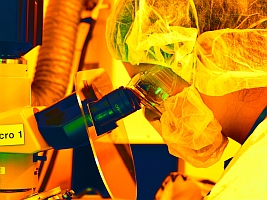The College of Nanoscale Science and Engineering (CNSE) of the University at Albany and Applied DNA Sciences Inc. in Stony Brook, New York will collaborate on nanotechnology-based solutions to prevent counterfeiting of computer chips. The partnership will focus on new methods for depositing DNA on nanoelectronics wafers and computer chips for authentication.
This collaboration in nanosecurity targets the $20 billion defense industry chip market and has the potential to affect civilian nanoelectronics and aerospace markets. The partnership is expected to help contractors and agencies meet provisions of Section 818 in the 2012 National Defense Authorization Act calling for stricter controls to keep counterfeit electronics parts out of defense and security supply chains.
CNSE and Applied DNA plan to accelerate the development of the company’s SigNature DNA product, including the addition of new methods for DNA deposition on nanoscale electronics wafers and chips, prior to and during final packaging, to ensure the integrity and security of processed wafers. Applied DNA’s technology uses DNA to apply a biological tag that gives the product a unique mark that verifies its originality.
The partnership involves joint research and development at CNSE’s Albany campus. The work is expected to include authentication protocols and procedures in current chip technologies, such as complementary-symmetry metal–oxide–semiconductor (CMOS), microelectromechanical systems (MEMS), and photonics, as well as more advanced packaging technologies.
Read more: Semiconductor Companies to Invest $4.4B in New York R&D
* * *


 RSS - Posts
RSS - Posts
[…] University, Company Partner to Combat Counterfeit Chips […]